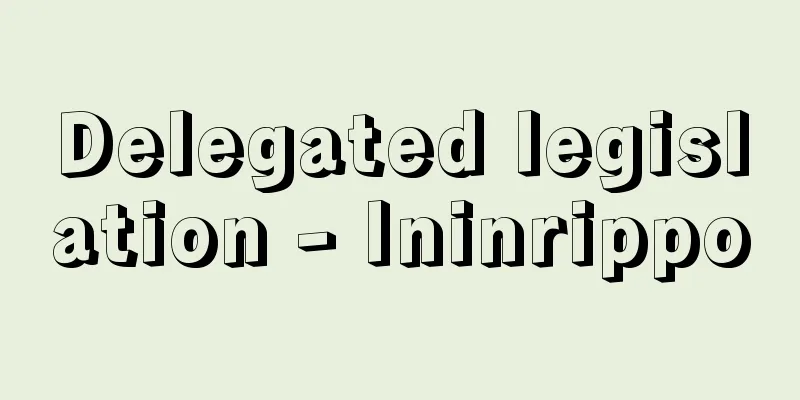Delegated legislation - Ininrippo

|
Issuing legal norms based on delegation by law. Specific manifestations of this are delegated orders and delegated ordinances. A typical example is a Cabinet Order issued by the Cabinet, but delegated legislation also includes rules issued by lower courts delegated by the Supreme Court (Constitution, Article 77, Paragraph 3), rules issued by the Board of Audit (Borough of Audit Act, Article 38), the National Personnel Authority (National Public Service Act, Article 16), the Public Safety Commission (Police Act, Articles 12 and 38, Paragraph 5), rules issued by governors and mayors based on delegation of ordinances, ministerial ordinances issued by ministers based on delegation by Cabinet Order, and ordinances enacted by local governments based on delegation of law (e.g., delegated ordinances such as the Shadow Regulation Ordinance set out in Article 56, Paragraph 2 of the Building Standards Act and the ordinance setting standards for the layout of bathhouses based on Article 2, Paragraph 3 of the Public Baths Act). The basis for the recognition of delegated legislation is, formally, the proviso of Article 73, Paragraph 6 of the Constitution, which stipulates that "penal provisions may not be established by government ordinances unless specifically delegated by law," but in reality, it is based on the technical expertise of the legislative details, the need to respond quickly to changes in circumstances, and the need to take local circumstances into consideration. Delegated legislation is an exception to parliamentary democracy (Article 41 of the Constitution), which places the Diet as the sole legislative organ, and therefore must be specific and specific, except for delegation to local ordinances. Until the end of World War II, there were carte blanche delegations that were tantamount to abandoning the legislative power of the Diet, such as the Nazi Enabling Act and Japan's National Mobilization Act, but this is no longer permitted today. Penalties cannot be established by government ordinances without the delegation of law. It is also understood that delegation of criminal elements to government ordinances and re-delegation by the delegatee is permitted. [Yasuhito Abe] Source: Shogakukan Encyclopedia Nipponica About Encyclopedia Nipponica Information | Legend |
|
法律の委任に基づいて法規範を発すること。その具体的な表れが委任命令や委任条例である。典型的な例は内閣の発する政令であるが、下級裁判所が最高裁判所から委任されて発する規則(憲法77条3項)、会計検査院(会計検査院法38条)や人事院(国家公務員法16条)、公安委員会(警察法12条・38条5項)などが発する規則、知事・市町村長が条例の委任に基づいて発する規則、政令の委任に基づき各省大臣が発する省令、地方公共団体が法律の委任に基づいて制定する条例(例、建築基準法56条の2に定める日影(にちえい)規制条例、公衆浴場法2条3項に基づく浴場の配置の基準を定める条例などの委任条例)なども委任立法である。 委任立法が認められる根拠は、形式的には「政令には、特にその法律の委任がある場合を除いては、罰則を設けることができない」と定める憲法第73条6項但書などに、実質的には立法細目の専門技術性、事情の変化に機敏に対応し、また地方的事情を考慮する必要性などに求められる。委任立法は、国会を唯一の立法機関とする議会制民主主義(憲法41条)からみて例外であるから、地方条例への委任を除き、個別的、具体的であることを要する。第二次世界大戦終了まではナチスの授権法や日本の国家総動員法など、議会の立法権を放棄するに等しい白紙委任が存在したが、これは今日では許されない。法律の委任なくして政令で罰則を定めることはできない。なお、犯罪構成要件を政令に委任したり、委任された者がさらに権限を委任する再委任もいちおうは許されると解されている。 [阿部泰隆] 出典 小学館 日本大百科全書(ニッポニカ)日本大百科全書(ニッポニカ)について 情報 | 凡例 |
>>: Commission of Attorney - Inin Meirei
Recommend
Artamidae
...While flying, they make a sharp cry that sound...
Copper pheasant (yamadori)
A bird (illustration) of the family Phasianidae in...
Wehlight - Wehlight
…In general, pyroxene is present in addition to o...
Hanging fixture - Kakegu
…The type of bedding and equipment varies dependi...
Port Sunlight
...Industrialists soon began to plan new towns th...
Kanjuji-ryu
...A family that originated from Confucianism, pa...
Pyrosulfuric acid; disulfuric acid
Chemical formula: H 2 S 2 O 7 . Also known as pyro...
Fragonard - Jean Honoré Fragonard
French painter. Born in Grasse in the south of Fr...
Sawagaya
One of the stage names of Kabuki actors. Used by I...
Scudéry, Madeleine de
[Born] 1607. Le Havre [Died] June 2, 1701. A Frenc...
Youth
"In the theory of the five elements, blue is ...
The Far East
…In November 1861 (Bunkyu 1), he became editor-in...
Tsarskoe Selo (English spelling)
...Population: 94,900 (1993). From 1728 to 1918 i...
Interfacial notation
A method of expressing the plan, scale, and style ...
Huerta, G. de la (English spelling) Huerta Gdela
…[Eiichi Inui]. … *Some of the terminology that m...








![Frederick [III] - Friedrich](/upload/images/67ccbdce6203a.webp)
